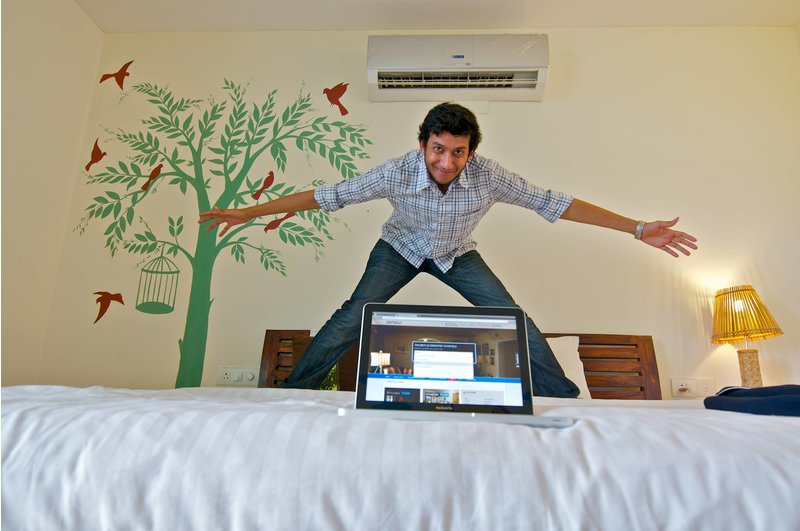19歲創業辦酒店,5年后公司估值達到50億美元,這位90后是如何做到的?

|
想在印度找到便宜干凈的酒店,簡直就是旅行者的噩夢。情況往往是,在網上看起來還不錯的酒店實際上位于一棟搖搖欲墜的樓里,蟑螂肆虐,浴室用水還得用桶從外面提進去。 睿泰什·阿伽沃的解決方案是提供一個訂房終端,承諾如實宣傳、提供品牌酒店供顧客選擇,絕不會給你“驚喜”。他于2013年成立的Oyo酒店已經成為印度最大的酒店連鎖,根據新德里調研公司Hotelivate的數據,印度混亂的酒店業市場價值45億美元。 目前,阿伽沃正在進軍海外市場,向想要加盟的小酒店業主開放他們的特許經營模式,提供預定網站和一整套服務。Oyo公司于9月底宣布,正在向軟銀、紅杉和其它投資者融資,希望籌得10億美元用于向包括中國在內的其它國家擴張,Oyo已于去年11月進入中國。Oyo在英國的生意在近期剛剛開張,這是公司業務首次進入發達國家市場。 “2023年,我們將成為世界上最大的連鎖酒店。”Oyo這位24歲的創始人最近在公司總部新德里郊區的一家酒店接受采訪時說。“我們想把世界各地零零散散的、沒有品牌的產業變成優質旅居空間。” Oyo有數百名線下員工的職責是按照包括床墊床單質量和水溫在內的200個指標對酒店進行評估。如果成功簽約,酒店能在路邊掛一個鮮紅的“Oyo”招牌,就像是高品質的蓋章認證;除此之外,大部分酒店老板需要同意由Oyo進行為期一個月左右的翻新。此后,Oyo從每筆酒店訂單中抽取25%。房間定價一般為25美元和85美元之間。 “Oyo正傾盡全力,打造友善親切的品牌形象,致力為酒店業主提供超大型基地和平臺。”RedSeer管理咨詢公司的分析員穆里甘克·古特古迪亞說。“Oyo軟件的訂房模式很成功,因為價格敏感型游客會根據地址搜索酒店,而且希望自己有很多選擇。” 阿伽沃不愿透露銷售額,但他表示成交量去年增長了三倍,其中90%來自回頭客——公司沒花一分錢做廣告。他說,現在Oyo覆蓋160個印度城市,有1萬家酒店,逾12.5萬間客房。據RedSeer估算,這差不多占印度全部酒店客房數的5%。 “每晚都有超過15萬旅客睡在我們酒店的床上。”阿伽沃說,他體型精干,一邊說話一邊扯一只生疼的耳朵。長期航行導致的耳朵疼可以說是公司飛速增長產生的一點不愉快的副作用。 臟床單 不是所有人都對自己在Oyo酒店的住宿經歷感到滿意。最近有位客人帕耶爾·古普塔就對新德里機場旁的一家酒店很不滿意,她覺得那房子在匆忙間被草草改成了酒店。床單是臟的,浴室十分促狹。“僅僅有Oyo品牌的洗發水和潤膚露可不行。”她說。 RedSeer分析師古特古迪亞稱Oyo需要穩定的資金流,還需要一支線下團隊維持酒店質量。“如何保障高質量的用戶體驗是個大難題。”他說。 根據調研公司CB Insights的數據,印度的創業企業最近勢頭迅猛,其中十幾家價值都超過10億美元。今年8月,沃爾瑪以160億美元的價格購入2007年成立的在線零售商弗利普卡特(Flipkart)的大部分股份。 據匿名知情人士透露,Oyo近期宣布的融資使公司估值達到50億美元。也就是說,是印度估值第二高的創業公司,屈居于One97 Communications之后,后者擁有電子支付公司Paytm,獲得了沃倫·巴菲特的伯克希爾-哈撒韋公司提供的資金支持。 在一個名校情結極為嚴重的國家,大學肄業生阿伽沃卻出人意料地成為商界之星,頻繁出席電視頒獎典禮,還登上了去年《福布斯》雜志印度版的封面。 阿伽沃說,他第一次住酒店是12歲,當時他被選中代表學校去離家幾個小時的一個鎮上參加知識競賽。幾年后,他周游印度,因為預算緊張不得不寄宿在一些環境極度惡劣的小旅館里,因而產生了成立Oyo的想法。他意識到僅僅通過網站把不同酒店集中起來是不夠的,還要對酒店進行修繕翻新。為了從零開始學習酒店業務,他花了一年時間在其中一家酒店打掃房間。 2013年,他從彼得·泰爾那里得到了一筆10萬美元的資助,彼得·泰爾是Paypal的聯合創始人,出錢資助輟學創業的學生。重大轉機出現在2015年,包括硅谷紅杉資本和日本軟銀集團在內的投資者向他提供了一億美元的風投。 去年11月,阿伽沃將生意拓展至中國,一開始只在工業城市深圳簽了一家酒店。不到一年的時間里,這個世界第一人口大國的旅行者已經可以在中國超過170個城市1000家Oyo酒店的87000間客房中進行選擇。 對于阿伽沃而言,還有個小問題。他說母親一直念叨讓他暫時離開手頭的生意,回去上學。“為什么要讓大學干涉我的教育呢?”他笑著說。(財富中文網) 譯者:Agatha |
Finding clean, affordable hotels in India can be a traveler’s nightmare. Too often, what looks good on a website turns out to be a roach-infested room in a crumbling building where water has to be schlepped to the bathroom in a bucket. Ritesh Agarwal’s solution is a booking app that promises truth in advertising and branded hotels that don’t deliver unpleasant surprises. The chain he started in 2013, Oyo Hotels, has already become the largest in India, a chaotic market worth $4.5 billion, according to New Delhi-based researcher Hotelivate. Now Agarwal is going overseas with his franchise model, which combines a reservation site with a full stack of services for small hoteliers who want to up their game. At the end of September, the company said it’s raising $1 billion from SoftBank Vision Fund, Sequoia Capital and other investors to fund expansion in countries including China, where Oyo opened in November. It started service in the U.K. recently, bringing the business to a developed market for the first time. “By 2023, we will be the world’s largest hotel chain,” the 24-year-old founder said in a recent interview at an Oyo hotel in a suburb of New Delhi, where the company is based. “We want to convert broken, unbranded assets around the globe into better-quality living spaces.” Oyo employs hundreds of staffers in the field who evaluate properties on 200 factors, from the quality of mattresses and linens to water temperature. To get a listing, along with a bright red Oyo sign to hang street-side like a seal of good-housekeeping approval, most hoteliers must agree to a makeover that typically takes about a month. Oyo then gets 25 percent of every booking. Rooms usually run between $25 and $85. “Oyo is going all out to build a very large base of hotel partners and become a bona-fide brand,” said Mrigank Gutgutia, an analyst with RedSeer Management Consulting. “Their app model works well because price-conscious travelers who search by location like to feel they have lots of choices.” Agarwal wouldn’t give sales numbers, but he said the number of transactions has tripled in the last year, with 90 percent coming from repeat travelers — and no money spent on advertising. There are now 10,000 hotels in 160 Indian cities, with more than 125,000 rooms, listed on the site, he said. That’s about 5 percent of India’s total room inventory, according to RedSeer estimates. “Over 150,000 heads rest on our pillows every night,” said Agarwal, a trim man who tugs at a sore ear as he talks. Constant airplane travel has given him an ear ache–one unwanted side effect of the company’s hyper growth. Dirty sheets Not everyone is happy with the Oyo experience. Payal Gupta, a recent guest, was disappointed by her stay at a property near Delhi Airport, which she said felt like a house that had been hurriedly converted into a hotel. The sheets were dirty and the bathroom was cramped. “It isn’t enough to have Oyo-branded shampoo and moisturizer,” she said. Gutgutia, the RedSeer analyst, said the company will need a steady stream of capital and an army of people on the ground to maintain standards. “Sustaining a high-quality experience could be a real challenge,” he said. Indian startups have been on a tear recently, with more than a dozen worth now more than $1 billion, according to researcher CB Insights. Walmart paid $16 billion for a majority stake in Flipkart on August, an online retailer founded in 2007. The funding announced recently by Oyo values the business at $5 billion, according to a person familiar with the deal who asked not to be identified. That makes the startup India’s second most-valuable, after One97 Communications, owner of Paytm, a digital payments company with financial backing from Warren Buffett’s Berkshire Hathaway A college dropout in a country where university pedigree is obsessed over, Agarwal has become an unlikely business star, with frequent appearances on televised award shows and a cover story last year in Forbes India. Agarwal says he never stayed at a hotel until he was picked to represent his school at a trivia competition held in a town a few hours away from home when he was 12. He got the idea for Oyo a few years later, while traveling India on a shoestring budget and lodging at some truly horrible guest houses. It wasn’t enough to aggregate hotels on a website, you also had to repair them, he realized. To learn the hotel business from the ground up, he spent a year cleaning rooms at one of them. In 2013, he got a $100,000 fellowship from Peter Thiel, the PayPal co-founder who subsidizes students who drop out to start their own companies. The big break came in 2015, when he got $100 million in venture funding from investors including Silicon Valley’s Sequoia Capital and Japan’s SoftBank Group Corp. In November, Agarwal brought the business to China, starting with a single listing in the industrial city of Shenzen. Now, less than a year later, travelers in the world’s most populous country can choose from more than 1,000 Oyo-branded hotels and 87,000 rooms in over 170 Chinese cities. For Agarwal, though, there’s still a small hitch. He says his mother keeps nagging him to take a break from the business and go back to college. “But why let university interfere with my education?” he said with a laugh. |













